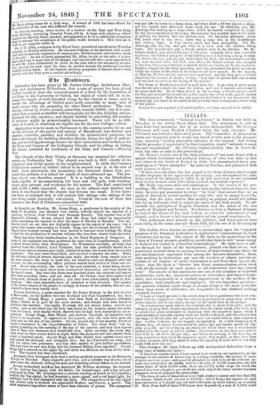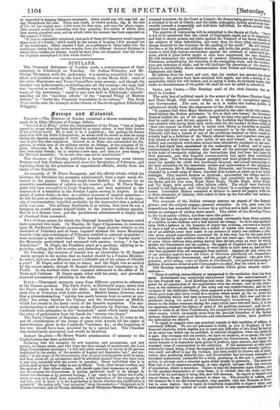IRELAND.
The long-announced "National Conference" in Dublin was held on Tuesday, at the Abbey Street Music Hall. The attendance is said to have been very numerous, but by no means distinguished; Mr. Feargus O'Connor and some English Chartists being tbe only strangers. Mr. O'Connor was indeed a deprecated guest. The Committee of preparation wrote and requested that he would not attend or take part in the proceed- ings; meaning "nothing personally offensive in the request," but feeling that his presence, if approved of by the Committee, would" seriously d image the new organization." Mr. O'Connor replied meekly, that he would at- tend, but take no part in the proceedings.
Mr. Maurice Leyne, one of the State prisoners of last year, began with a speech which disclaimed and palliated nothing of what was done by him and others in the South of Ireland in 1848, but characterized those pro- ceedings as a" brave enterprise" for national freedom, and proceeded with such phrases as this- " If there were any there who had shared in the divine delirium which sought to take vengeance on the oppressors of the country, and who snatched the chas- tising sword of the Almighty to inflict it, let him know that he who addressed them at that moment stood before them a defiant and exultant reprobate."
Mr. Duffy was more mild and conciliatory. In the course of the pro- ceedings, Mr. O'Connor seems to have been tacitly released from his pro- mise: he rose, and proceeded to swear " by God," that sooner than be an apple of discord he would sacrifice his very life; and to assure Lord Cla- rendon, that his spies, sent to that meeting on purpose, would not induce him by an indiscreet word to injure the cause of the Irish people. He ad- vocated the principles of English Chartism, and the union of the two peoples of England and Ireland. Resolutions to form a National Alliance, to correct the abuses of the land system, to resist the endowment of any church, and to favour a full representative reform, passed unanimously.
Two policemen were present in the galleries, and horse-patrols were seen riding in the street near the Music Hall, till the eve of its breaking up
The Dublin Press devotes an article to commentary upon the "reported progress of the Practical Instructors in Agriculture," commissioned by Lord Clarendon last spring. The report of Mr. Quin on his proceedings in the Union of Fermoy presents gratifying proofs that there is still "some energy in Ireland not wasted in chimerical undertakings." Mr. Quin went in per- son through the lands of the husbandmen, pointed out their errors, and practically assisted them in carrying lessons of improvement into effect: he got sub-inspectors appointed from among the farmers themselves; these, after profiting by instruction, are now the teachers of others, and the re- porters of all matters of useful information to and from their special dis- tricts: thus Mr. Quin is "thrown into direct communication every week with all the tenants on such estates as sub-instructors have been placed over." The results of this machinery are seers in the adoption of improved implements, seeds, Sec., improved courses of cultivation, and improved pro- duce; and consequently in a marked improvement in the position of the population, both employers mid employed. On one important question— the question whether spade tillage or plough tillage is the more profitable when large areas of cultivation are compared—he has obtained striking practical results-
"! have at length proved, to the satisfaction of those gentlemen who have com- plied with my suggestions, that the soil can be prepared for green crops in a su- perior manner, and to any depth, cheaper by the spade than by the plough.
"In commencing spade labour, the employer was in dread of its coat; and the labourer, judging from former experiments with the native spade, (the fack, as it is called,) felt great reluctance in beginning with the improved spade, which I have introduced into this country from the North of Ireland, and was certain that the wages I offered (16s. 8d. per acre) would not enable him to earn sispence a day : in this, however, he was happily disappointed. In a field belonging to S. Bowles, eq., of Ahern, I commenced by giving lid. per statute perch for dig- ging properly, and throwing up all stones (of which there was a comiderable quantity) to the depth of twelve inches: the labourers on this farm were able to earn from Is. ld. to Is. 3d. per day ; and before the evening of the first day, on being asked how they liked the improved spade, they replied, as they have done in every instance, that they could do twice the quantity of work with it that they- could with their old one."
This instance Mr. Quin follows up with arithmetical deductions from a large class of authentic facts- " I find from reports which I have caused to be made by sub-instructors, on the acreage, of the number of horses kept in working condition, the number of acres of green and corn crops, and quantity ploughed on each farm on Use different es- tates over which they are placed, that in a district of 16,636 acres there are 618 horses kept; of these 16,636 acres, there are 6,797i under crops for which the ground has been ploughed, and about one-sixth only of the latter number has been ploughed twice or prepared for green crops. The,keepmf eecii of thee horses (one with another) cannot cost less than 201. per annum; which would amount to 12,3601.; which twinge the expense of each acre cultivated, or I should say, not half cultivated, by horse labour, up to nearly 21. Now, if one-half of these 618 horses were disposed of, a sum of 6,1801. could
be expended in keeping labourers employed; which would pay 460 num 10d. per day, throughout the year. These men could, in twelve months, dig, at the rate of 16s. 8d. per statute acre, 6,900 acres for that sum, and earn the above wages. This amount would be something over that quantity, five-sixths of which have been merely ploughed once, and on which twice the amount has been expended on the support of horses. "It may be reasonably calculated, that each of these 460 labourers would support three more of a family; which would be the means of keeping 1,840 paupers out of the workhouse; which number I find, on a reference to those taken into the workhouse during the last twelve months, from the different electoral divisions in which these estates are situate, would be more than one thousand over the num- ber of people =employed in that whole district."



























 Previous page
Previous page